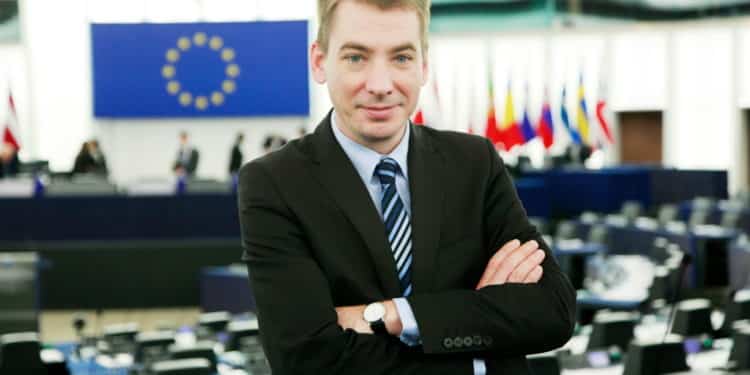Benedek Jávor is a fighter. A fighter for knowledge, for democracy, for the environment, for his country, and for the rights of all people.
Jávor attended the 1,000-year-old Benedictine High School of Pannonhalma in Hungary, one of the oldest continuously operating schools in the world. At age 28, not long after receiving a master’s degree in biology, he helped found the environmental NGO Védegylet (Protect the Future!), which helped elect László Sólyom as president of Hungary.
In rapid succession, Jávor went on to help found the green-oriented political parties Dialogue for Hungary and Politics Can Be Different, earned a PhD and a university professorship, and was elected to the European Parliament as a member of the European Green Party.
When voters sent him to Brussels in 2014, Jávor says his public service would be guided by three values: sustainability, transparency and social justice. In his home country, whistleblowers were being retaliated against and Prime Minister Viktor Orban was undertaking what The New York Times called an “autocratic crackdown on the nation’s press.” Edward Snowden’s disclosures were on the front pages, soon to be followed by the Lux Leaks tax evasion scandal and then the Panama Papers revelations. “These cases opened the eyes of many people about how important whistleblowers are,” says Jávor.
Less than a year before Jávor was elected, EU Home Affairs Commissioner Cecilia Malmstrom bluntly rejected the idea of protecting whistleblowers Europe-wide. That didn’t stop Jávor.
“When we first came up with idea, the first reaction by the [European] Commission and the Parliament was complete rejection,” he says. “They said there was no proper legal basis for regulating whistleblowing at the EU level. They said it was not possible.”
“We were met with complete resistance by the Commission. So my idea was – OK, you’re telling me I do not know enough and that it’s legally impossible. We went step by step. Let’s try to draft a Directive and give evidence that it is technically possible. For a year we talked with many experts and organized conferences. We concluded it was not easy but not technically impossible.”
“We drafted a Directive and went back to the Commission to see what their next argument would be against the proposal. We proved there are solutions based on EU law. That was the best moment for us – finding the legal basis.”
“We popularized the draft law, and more and more people realized the campaign might be successful. Many other political groups picked up the story and started to push it. The Council of Ministers supported the idea and called on the Commission to analyze it. This was the game changer.”
“It was partly surprising to see that after years of listening to people saying we were doing something crazy and impossible, they were now behaving like they had been working on this issue for years. It was in the air. It was a lonely right that suddenly becoming popular. It happened very quickly. We had good cooperation with trade unions and NGOs. It was a nice piece of teamwork.”
A useful coincidence was the fact the European Commission’s new president was Jean-Claude Juncker, the outgoing prime minister of Luxembourg. He had publicly pledged to “try to put some morality, some ethics, into the European tax landscape.” Two weeks after taking office in November 2014, PricewaterhouseCoopers employees Antoine Deltour and Raphaël revealed that under Juncker’s premiership, Luxembourg secretly had given massive tax breaks to more than 300 multinational corporations including Amazon, Fiat, IKEA, McDonald’s Pepsi and Starbucks. Lux Leaks became Juncker’s biggest headache and Jávor’s greatest opportunity.
“The Commission was in trouble,” Jávor says. “President Juncker’s own country was the most active in tax evasion. It was absolutely awkward for the Commission and for Juncker personally. They were desperately looking for something to improve their image. They very cleverly chose this point to go ahead. It was a smart move on their side. If anyone critiziced the Commission and Juncker, they could say, ‘Look, we passed the whistleblower Directive.’ The Commission eventually was constructive and accepting. They realized that if they couldn’t supress it, they had to lead it.”
“Jávor’s tenacity paid off. Last October, EU officials approved a Directive that requires all 27 EU countries to enable employees to report misconduct, protect them from dismissal and other reprisals, and penalize people who retaliate against whistleblowers.”
“We were really in the right place at the right time. If we did it now, it might not work. That was our moment.”

